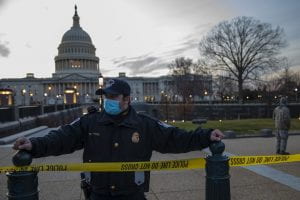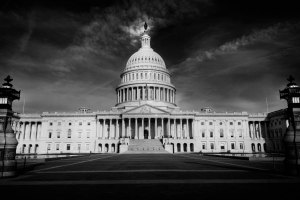Division, partisanship, polarization – these are all terms we consistently hear in current news headlines about the state of our citizenry and political landscape. Much of the conversation and argument about contemporary politics and social activity is about individual and collective anger and rage. But these words are often used in vague and amorphous ways.
Episode 2 of American Democracy Lab podcast will help us understand what anger means, particularly at this moment, and how we can build a more United States.
Our Guests and Guest Host
Dr. Peter Kastor (Guest Host) is chair of the History Department. He teaches about and studies the American Presidency. A regular guest on St. Louis Public Radio and other broadcasts, he’s also written about the Presidency for outlets including The Huffington Post, The Conversation, and Fortune Magazine.
Dr. Betsy Sinclair is a Professor of Political Science at Washington University. Her research interests include American politics and political methodology with an emphasis on individual political behavior.
Dr. Alan Lambert is an associate professor of psychology at Washington University. The overarching focus of Professor Lambert’s research is the cognitive and affective processes that underlie social and political judgment.
About American Democracy Lab
The American Democracy Lab podcast at WashU brings together experts from different fields and backgrounds to talk about an issue or aspect of our American democracy and where different perspectives may converge.
Launched on Presidents’ Day 2021, the American Democracy Lab podcast is hosted by Associate Professor Alan Lambert and presented by the Gephardt Institute for Civic and Community Engagement in partnership with WashU Engage and the Department of Psychological & Brain Sciences.
Additional Episodes of American Democracy Lab
The founders of the US argued the necessity of a robust system of public education to support democracy. One of US higher education’s missions was to foster an educated populace who could engage in debate and dialogue. Over the past century, the role of higher education in the US democratic has shifted, and, recently, has become highly politicized. This episode […]
In part two of our conversation revisiting the insurrection at the US Capitol Building on January 6, 2021, guests Richard Gephardt and Zach Wamp discuss the history of elections in the United States and identify potential reforms that could increase trust in the system. They offer their advice to current members of Congress on how to bridge the widening gap between Republicans and Democrats to restore faith in our democracy.
Our guests, the Honorable Richard ‘Dick’ Gephardt and Zach Wamp, spent much of their careers working inside the Capitol building as members of the US House of Representatives. In this conversation, they reflect on January 6th, recounting where they were when they first heard about the attack, what the legacy of January 6th represents for our democracy, and where we as a nation go from here.
How do we build trust among Americans who have turned their back on the truth? How can we heal the deep divisions in our country? Host Alan Lambert welcomes author, lecturer, and journalist Anne Nelson to discuss the eroding trust in our democracy through a conversation about influence and information, an exploration of the Council […]
The fate of our democracy is increasingly entwined in the systems that govern and guide our economy, culture, environment, and more. Guest Nate Hagens and host Alan Lambert discuss big questions, including: How is energy related to climate change and what does this imply about future? Why are climate and energy issues so important to […]

